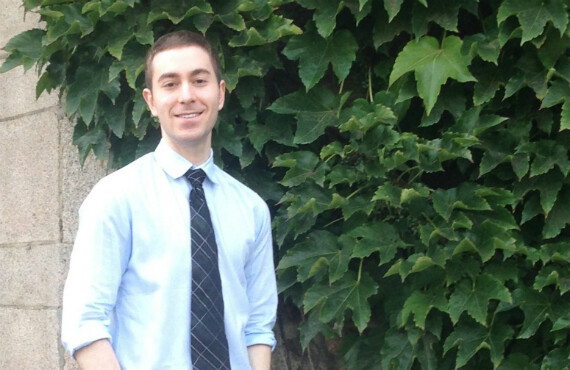Taking ‘The Condom Pledge’: Penn Student’s Project Leads to Global Changes
Jason Parad is changing lives, and he’s doing it with condoms.
As part of a dual master’s degree in public health and bioethics at the University of Pennsylvania’s Perelman School of Medicine, Parad launched The Condom Pledge, a campaign calling for youth to promise to use condoms during sex and to publicize their oaths.
The goal is to change social norms in order to prevent HIV/AIDS, other sexually transmitted diseases and unwanted pregnancies on a global scale. Since its launch in March 2013, the Condom Pledge has attracted more than 30,000 supporters from 60 countries and aligns with the global engagement principle set forth in President Amy Gutmann’s Penn Compact 2020.
Aware of the growing HIV epidemic and ongoing related public health efforts, Parad, was traveling through Asia as part of a research trip during the 2012-13 winter recess when he realized that improving sex education in schools and expanding access to condoms was not enough.
“Far more important,” says Parad, “is tackling the societal norms that forbid the use and, in some cases, even discussion of condoms.”
Under Karen Glanz, a Penn Integrates Knowledge professor with a joint appointment in Medicine and the School of Nursing, and Rosemary Frasso, a senior fellow at the Center for Public Health Initiatives, Parad learned how to apply health-behavior-change theories to create “a boldly simple intervention to normalize condoms.”
Chyke Doubeni, an associate professor in the School of Medicine, observed the campaign’s growth during the last year and says Parad’s creativity is unparalleled.
“This program represents an ingenious use of social media to demystify the tools for prevention of HIV, particularly in developing countries, with the potential to produce long-lasting change in attitudes toward condoms,” Doubeni says. “Jason’s ability to engage people from such a wide range of cultures is remarkable.”
With 15 youth advocacy partnerships internationally, Parad’s project is making a big difference in places like Ghana, Malawi, Zambia, Kenya, Zimbabwe, Uganda, Indonesia, Nepal, Cambodia, Vietnam, Jamaica and Sierra Leone, where more than 5,000 young people have been educated about condom use.
One example of how the network has served as a catalyst for change was during a World AIDS Day event, Parad says. After campaigning throughout Sierra Leone, The Condom Pledge assembled a group to march through Bo, an area with staggering rates of HIV. Soon after, the Ministry of Health and Sanitation approved the group’s efforts and began supplying the organization with condoms for all of its upcoming campaigns there.
The Condom Pledge is also working to address other public-health concerns, like the Ebola virus outbreak in West Africa.
Parad says that, while agencies have sent medical experts to evaluate the situation, few have assisted in the field operations that address containment. But The Condom Pledge is leveraging its networks to help reduce the spread of Ebola in places like Sierra Leone, where access to health information is limited and resources are scarce.
On-the-ground volunteers are providing education about the signs and symptoms of Ebola and delivering buckets and soap for hand washing.
“The Condom Pledge is well respected in Sierra Leone, allowing us to act quickly and effectively,” Parad says. “Given our familiarity and success with educational campaigns, helping out with Ebola prevention in this time of crisis is a no-brainer.”
Parad finished the public-health portion of his degree earlier this year and is now participating in the Blakemore Freeman Fellowship, a year-long program that supports him in his studies of the Korean language at Seoul National University. He plans to continue his coursework online and is scheduled to earn his master’s in bioethics in December.
"The uptake of The Condom Pledge has been truly impressive and foreshadows the lasting contributions Jason will make to the field of global health," says Jennifer Pinto-Martin, professor of nursing and director of the MPH Program and Penn's Center for Public Health Initiatives. "He has inspired both his classmates and the faculty, and we're all exited to see what he does next."
Parad says that, while abstinence pledges have long been studied and considered a potentially viable solution, the idea of a condom pledge has yet to appear in an academic journal. He’s all set to change that, too.
“My next step is to demonstrate the campaign’s effectiveness and then publish the results to begin an important conversation in public health,” Parad says, adding that it’s a humbling experience to watch an academic idea transform into thousands of pledges being made around the world, especially in the public-health sector, in which the translation of theory into practice is never easy.
“Every pledge is a testament to the impact of the campaign and an inspiration to continue onward,” Parad says.








